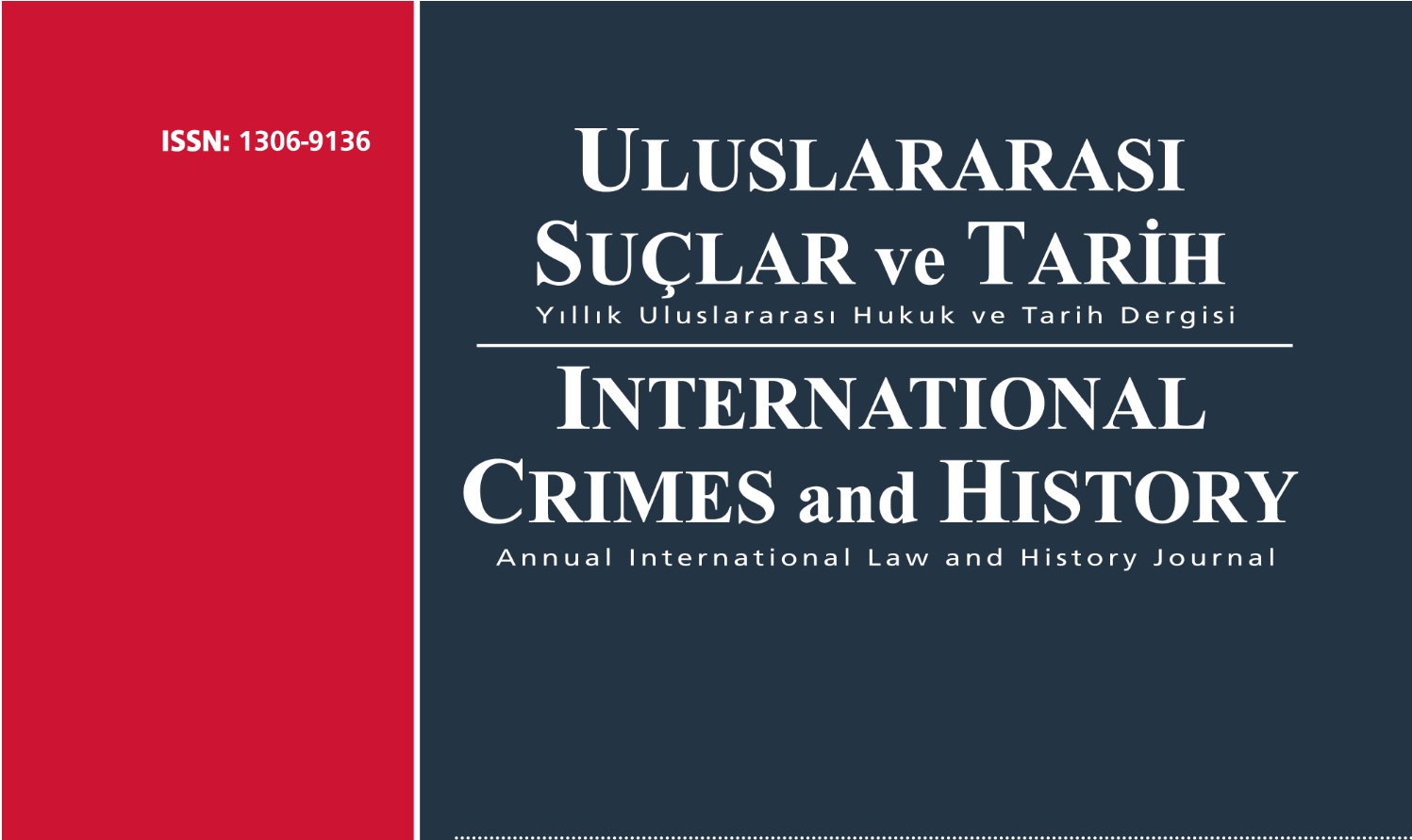THE 20th ISSUE OF ULUSLARARASI SUÇLAR VE TARIH / INTERNATIONAL CRIMES AND HISTORY HAS BEEN PUBLISHED
Download PDF :


The 20th issue of Uluslararası Suçlar ve Tarih / International Crimes and History (UST / ICH) consists of four research articles and four book reviews.
The first research article in this issue is Gül Akyılmaz’s “Kilikya Ermeni Katalikosluğu Davası Çerçevesinde Emvâl-i Metruke Meselesine Bakış” (A Look at the Emvâl-i Metruke Question in Relation to the Armenian Church Catholicosate of Cilicia Lawsuit).In this article, Akyılmaz focuses on the question of the properties that were left behind by the Armenians who were subjected to relocation and resettlement by the Ottoman Empire during the World War I (known as Emvâl-i Metruke) as one of the disputes that was inherited to Turkey from the Ottoman Empire. Observing that in recent years the number of lawsuits on religious and non-Muslim foundations is increasing, Akyılmaz studies the process that was opened by the lawsuit filed by the Armenian Apostolic Church, also by name Armenian Catholicosate of Cilicia in Lebanese records, on 28 April 2015 in Turkey. On this ground, she investigates how regulations regarding Emvâl-i Metruke, Ottoman land regime, and Ottoman laws on foundations would affect the decisions of the Turkish courts and the European Court of Human Rights.
“The Other Face of the Communist Regime: Concentration Camps in Bulgaria according to CIA Reports (1944-1955)” penned by Selcen Özyurt Ulutaş is the second research article in this issue. Ulutaş in this article investigates oppressive policies of the communist regime in Bulgaria, which came to power after the collapse of the fascist rule in Septeber 9th, 1944, that targeted the ethnic and religious groups deemed as adversary to the government. Within this framework, she addresses the oppressive measures of the communist regime between 1944 and 1955 as described in the CIA reports.
The third research article is Gözde Turan’s “Katyn: Politics of the Dead PoWs at a Dead End?” In this article that discusses the massacre of approximately 15,000 Polish prisoners of war in the Katyn forest in Poland, Turan reflects on the ways in which different actors interpret this massacre and how they utilize this tragedy as a political instrument. Accordingly, she provides an outlook on this tragedy that goes beyond Realpolitik analyses.
The last research article in this issue titled “Endüstri Sonrası Çalışma İlişkilerinde Yapay Zekâ, Acımasız Rekabet ve Suç Önleme Politikası” (Artificial Intelligence, Fierce Competition and Crime Prevention Policy in Post-Industrial Labor Relations). The author of the article, Özlem Küçük, addresses the developments in industry and technology and discusses the ways in which progress in the field of artificial intelligence may affect public security.
The 20th issue of UST / ICH, in addition to these four research articles, contains four book reviews. The first book review authored by Doğanay Eryılmaz titled “Ermeni İddiaları Üzerine Çoklu Bakış Açısı” (Multiple Perspectives on Armenian Claims) assesses Birsen Karaca’s “Ermeni İddiaları ve Tamalgı Sorunu” (Armenian Claims and the Problem of Apperception) that contains updated versions of the presentations and articles of the author between 2003 and 2019.
Fethi Kurtiy Şahin’s “Ukrayna’nın Maidan’ı, Rusya’nın Savaşı” (Ukraine’s Maidan, Russia’s War) reviews Mychailo Wynnyckyj’s “Ukraine’s Maidan, Russia’s War: A Chronicle and Analysis of the Revolution of Dignity,” a monograph that examines the EuroMaidan revolution in Ukraine, which took place between November 2013
and February 2014, and the effects of this revolution.
Berfin Mahide Ertekin in her “Kelebek Etkisi: Rusya’nın Türk Dış Politikasına Etkisi – Kuzey Afrika” (Butterfly Effect: The Impact of Russia on Turkish Foreign Policy –North Africa) examines Numan Hazar’s “Sovyet Tehdidinin Gölgesinde Türk Dış Politikası Kuzey Afrika Örneği” (Turkish Foreign Policy on North Africa under the shadow of the Soviet Threat), in which Hazar addresses the Turkey’s approach of allying with the West at the face of threatening policies of the USSR after the World War II and the limits that this approach had imposed on Turkish foreign policy by focusing on the example of North Africa.
The last book review in this issue is the review titled “Geçmişle Cesur Bir Yüzleşme” (A Brave Encounter with the Past) penned by Muhammed Nurullah Ketkanlı. Ketkanlı in this article reviews Svetlana Aleksiyeviç’s (Svetlana Alexievich) “İkinci El Zaman- Kızıl İnsanın Sonu” (Secondhand Time: The Last of the Soviets), the third edition of which was published in Turkish in July 2018, in which Aleksiyeviç tells the story of the “ordinary person” in Soviet times, which has not found its representation in the official historical narratives.





























